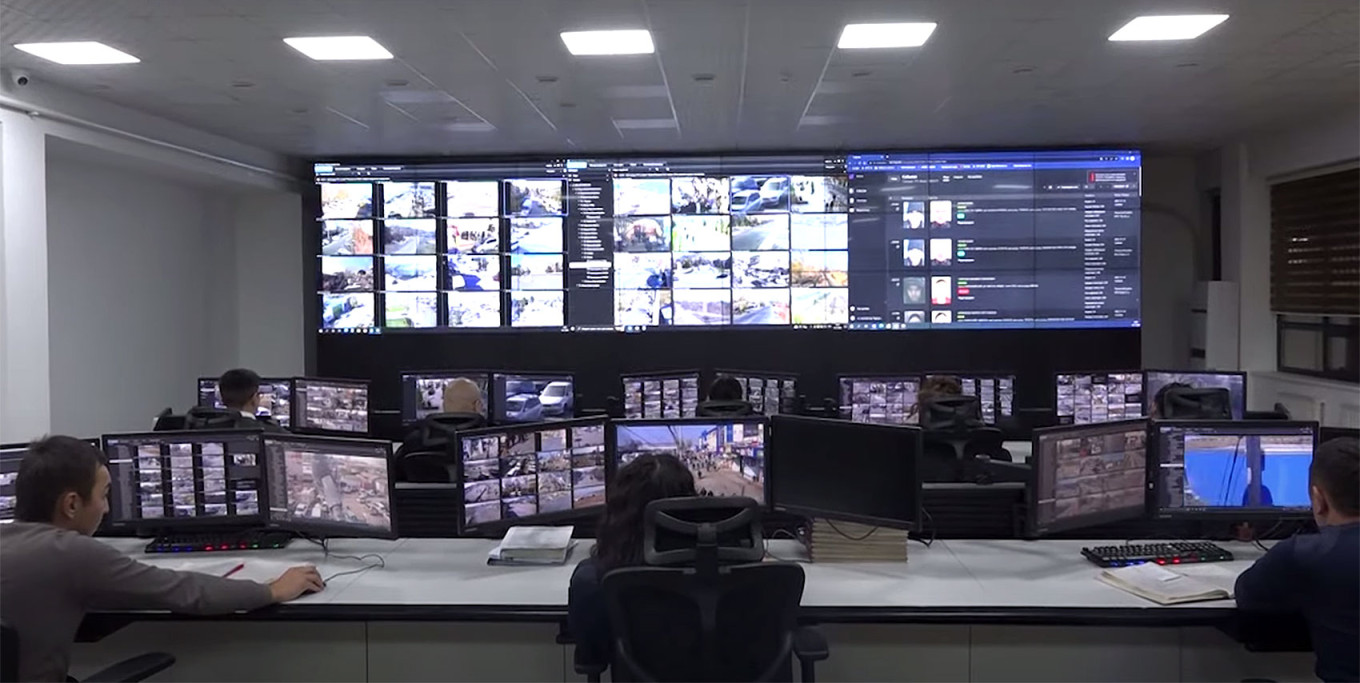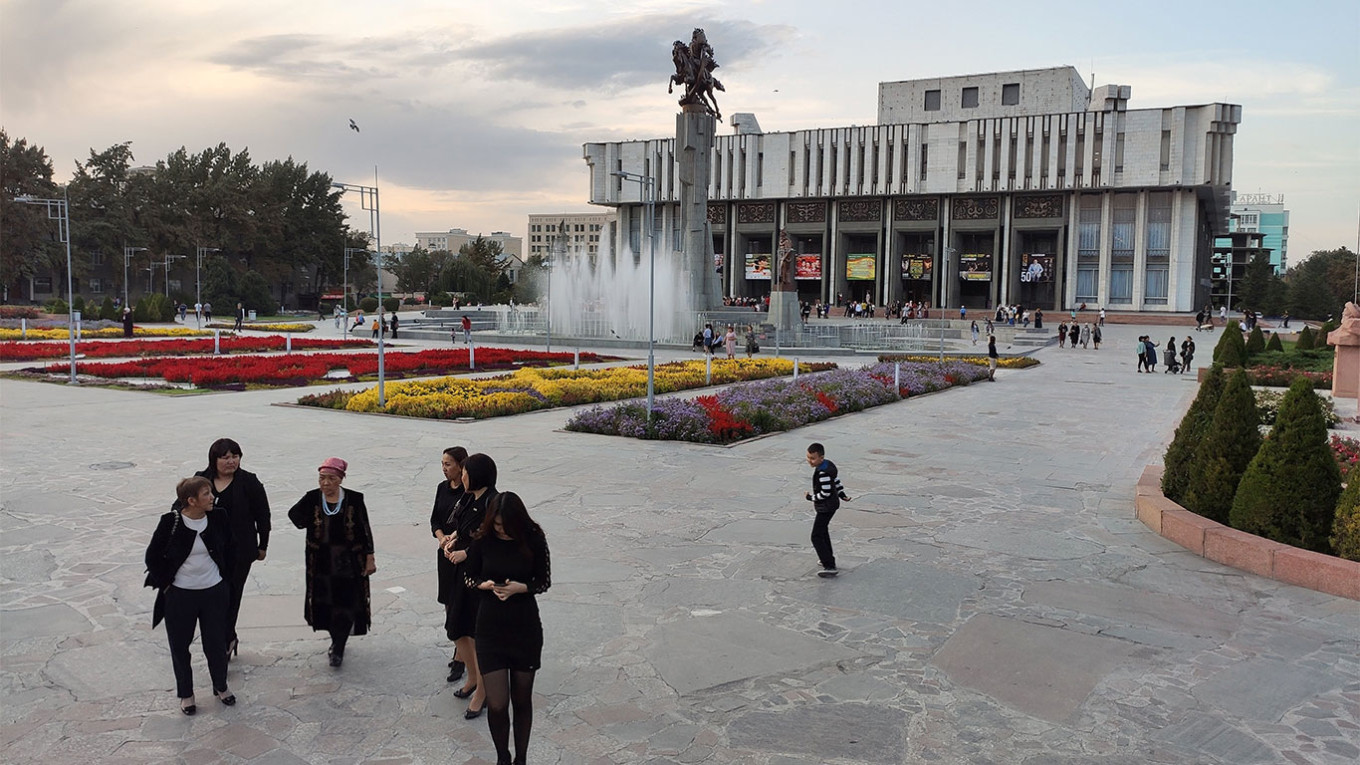Updated to clarify a quote.
Authorities in Kyrgyzstan are increasingly at odds with the country’s newfound contingent of Russian emigres, with a spate of concert cancellations and the use of facial-recognition technology to track down Russians wanted by Moscow contributing to increased friction.
On Monday the rapper Morgenshtern, who was labeled a “foreign agent” in Russia last year after he criticized the invasion of Ukraine, became the third Russian musician to have a Kyrgyz show canceled this month.
Authorities in the ex-Soviet Central Asian republic, which maintains close ties with Moscow, cited “morality concerns” in the decision issued by the Kyrgyz culture ministry. Promoters of the music festival that Morgenshtern had been set to headline said they received anonymous death threats over the rapper's appearance in the line-up.
But a source close to the Kyrgyz parliament, where deliberations over the concert took place Friday, linked the cancellation to criminal proceedings against Morgenshtern in Russia.
“The main reason [for the cancellation] was the criminal case against Morgenshtern in Russia and his escape from the country without being held accountable,” the source told The Moscow Times Monday on condition of anonymity.
Morgenshtern, whose real name is Alisher Valeyev, left Russia in late 2021 after being accused of promoting drug use in his music videos. A Russian court fined him 100,000 rubles ($1,200) on the charges last year.
Russian authorities are now said to be planning to launch a criminal case against him for violating the rigorous rules imposed on “foreign agents.”
“The fact that [Morgenshtern] stupefies young people” gave the culture ministry additional grounds to cancel the concert on “morality concerns,” said the source familiar with the Kyrgyz authorities’ decision-making.
According to the source, Kyrgyzstan’s recently deployed facial-recognition system — with a database of 85,000 people wanted by Russian law enforcement agencies — also played a role in the decision to call off the concert.
“I can’t say how exactly, but [Kyrgyzstan’s facial-recognition system] is presumed to be connected,” they told The Moscow Times, as Morgenshtern could have been one of the suspects uploaded into the system.
The Kyrgyz interior ministry said last week that the system helped identify and detain four citizens of Russia and Uzbekistan, another ex-Soviet republic in Central Asia, wanted by their home countries on suspicion of extremism, hooliganism, forgery and murder.
The announcement followed reports over the past month that Kyrgyz authorities have arrested three Russian anti-war activists who face criminal hooliganism and extremism charges in Russia.
One of them, who was accused of setting fire to a Russian military recruitment office, was reported to have been deported to Russia.
“Don’t come to Kyrgyzstan. Especially if you have issues with political cases in Russia,” tweeted one longtime emigre.

Hundreds of thousands of mostly young Russian men and women are estimated to have flocked to neighboring countries such as Kyrgyzstan after Russia invaded Ukraine in February 2022 and launched a draft of military-age men in September.
In addition to its arrests of Russian anti-war activists, Kyrgyzstan made headlines in June after two Russian rock bands had their shows in Bishkek canceled.
The anti-war punk band Pornofilmy said they were forced to call off their show following threats by Kyrgyz security services against local venues.
The chart-topping Russian-Belarusian band Bi-2, whose lead singer was labeled a “foreign agent” by Moscow last month, canceled its concert over an organizational dispute between Kyrgyz and Kazakh promoters.
Bi-2, Pornofilmy and Morgenshtern were among the anti-war Russian artists named in a 2022 blacklist that media said was circulated among promoters within Russia.
Other artists on the blacklist, including the rappers Noize MC and Kasta as well as Eurovision 2021 semifinalist Manizha, have been able to stage shows in Kyrgyzstan in the months since Russia invaded Ukraine in 2022.
Meanwhile, Kyrgyzstan's Central Asian neighbor Kazakhstan on Monday canceled a concert featuring Russian singer Grigory Leps following a wave of outcry over his support of the invasion of Ukraine.
A Message from The Moscow Times:
Dear readers,
We are facing unprecedented challenges. Russia's Prosecutor General's Office has designated The Moscow Times as an "undesirable" organization, criminalizing our work and putting our staff at risk of prosecution. This follows our earlier unjust labeling as a "foreign agent."
These actions are direct attempts to silence independent journalism in Russia. The authorities claim our work "discredits the decisions of the Russian leadership." We see things differently: we strive to provide accurate, unbiased reporting on Russia.
We, the journalists of The Moscow Times, refuse to be silenced. But to continue our work, we need your help.
Your support, no matter how small, makes a world of difference. If you can, please support us monthly starting from just $2. It's quick to set up, and every contribution makes a significant impact.
By supporting The Moscow Times, you're defending open, independent journalism in the face of repression. Thank you for standing with us.
Remind me later.






